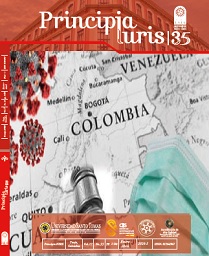Integral training of lawyers: ethical exercise and their social responsibility
Main Article Content
Abstract
The aim is to generate a reflection regarding the role and commitment of the family and the State’s educational system in public education, and individuals in the private one, who have arranged for the training of children, students and professionals, from a starting point and ethical source, facing the evolution that social demands represent.
Article Details
Por medio de esta comunicación certifico que el artículo que estoy presentando para posible publicación en la revista institucional impulsada de la Facultad de Derecho de la Universidad Santo Tomás seccional Tunja, Principia Iuris, es de mi entera autoría, siendo sus contenidos producto de mi directa contribución intelectual.
Todos los datos y referencias a publicaciones hechas están debidamente identificados con su respectiva nota bibliográfica y en las citas que se destacan como tal.
Por todo lo anterior, declaro que el material presentado se encuentra conforme a la legislación aplicable en materia de propiedad intelectual, y por lo tanto, me hago responsable de cualquier reclamación relacionada a esta.
En caso de que el artículo presentado sea publicado, manifiesto que cedo plenamente a la Universidad Santo Tomás seccional Tunja los derechos de reproducción del mismo y accedo a las modificaciones que de forma se requieran para adaptarse a la estética de la revista. Como contraprestación de la presente cesión, declaro mi conformidad de recibir (2) ejemplares del número de la revista en que aparezca mi artículo.
References
Agudelo, A. (2013). Aporte ético de la familia y el sistema educativo a las organizaciones. Horizontes Pedagógicos, 15, 104-116.
Anzola, S. I. (2016). La enseñanza de “una” ética profesional del abogado a través del aprendizaje basado en problemas. Derecho Público, 37, 1-18. http://dx.doi.org/10.15425/redepub.37.2016.07
Argandoña, A. (1999). La enseñanza de la ética por el método del caso. Academia. https://www.academia.edu/23418008/LA_ENSE%C3%91ANZA_DE_LA_ETICA_POR_EL_METODO_DEL_CASO
Colprensa. (08 de noviembre de 2019). Estos son los departamentos con más abogados corruptos del país. Vanguardia. https://www.vanguardia.com/colombia/estos-son-los-departamentos-con-mas-abogados-corruptos-del-pais-HEVL430456
Corte Constitucional. (18 de Mayo de 2011). Sentencia C-398. [M.P. GABRIEL EDUARDO MENDOZA MARTELO].
Corte Constitucional. (01 de Noviembre de 2011). Sentencia C-819. [M. GABRIEL EDUARDO MENDOZA MARTELO].
Decreto 196. Por el cual se dicta el estatuto del ejercicio de la abogacía. 2 de febrero de 1971. [El presidente de la República de Colombia].
Echegoyen, O. Javier. Historia de la filosofía Volumen 2: Filosofía medieval y moderna. Editorial Edinumen, 1996
Garrido, M. A. (06 de diciembre de 2019). Cada mes, tres abogados son excluidos de la profesión por corruptos. eluniversal. https://www.eluniversal.com.co/colombia/cada-mes-tres-abogados-son-excluidos-de-la-profesion-por-corruptos-186281-HBEU284641
Patiño, J. (05 de noviembre de 2019). En los últimos 25 años, han sido excluidos de la profesión 480 abogados. Ambitojuridico. https://www.ambitojuridico.com/noticias/procesal-y-disciplinario/en-los-ultimos-25-anos-han-sido-excluidos-de-la-profesion-480
Redacción justicia. (10 de octubre de 2019). Cada ocho días un abogado pierde la tarjeta profesional. Eltiempo. https://www.eltiempo.com/justicia/cortes/analisis-sobre-numero-de-sanciones-a-abogados-en-el-pais-414350
Redacción negocios y economía. (20 de noviembre de 019). Colombia, el segundo país con más abogados en el mundo. Elespectador. https://www.elespectador.com/economia/colombia-el-segundo-pais-con-mas-abogados-en-el-mundo-articulo-698171
Rodríguez, L. I. (2005). Ética argumentativa en Aristóteles. Revista Digital Universitaria, 6(3), 1-40.
Universidades. (20 de octubre de 2019). Los vacíos en la enseñanza de la abogacía en Colombia. Dinero. https://www.dinero.com/edicion-impresa/caratula/articulo/facultades-de-abogacia-en-colombia-y-los-vacios-en-la-ensenanza/225902
Velásquez, J. A. (06 de diciembre de 2019). Libertad de Cátedra. Elmundo. https://www.elmundo.com/portal/opinion/columnistas/libertad_de_catedra.php#.XmENyqhKjIV

